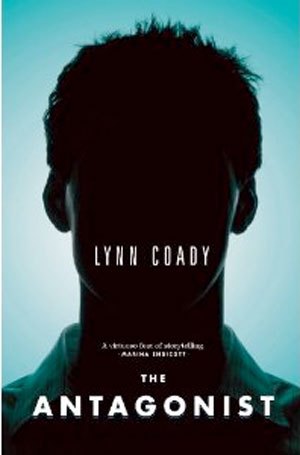If this review were a sports headline it would read “COADY IN THE TIME OF CROSBY.” At least that’s what I imagine some media factions coming up with between the six of them over a three thousand dollar power lunch at The Keg Mansion as we learn that a book about a hockey thug’s lexical revenge has just been shortlisted for the Giller Prize.
Coady, who calls Edmonton home now made a huge entry into fiction in 1998 when her book Strange Heaven was nominated for a Governor General’s Award. She also won the Air Canada Award for most promising writer under 30. Her last major literary undertaking was The Anansi Reader which she edited in 2008 for the press’s 40th anniversary.
The first thing I thought about for a day or so when I started reading Coady’s fifth book The Antagonist was Oscar Wilde. In particular De Profundis the legendary epistolary piece that was published well after Wilde’s death. The letter of course addresses Bosie, his lover and best friend, who betrayed Wilde and ultimately led to the bard’s imprisonment and public disfavour.
So flash-forward a century and some change and we have male entitlement still running wild and dominating the psychic sphere in every property (both intellectual and vapid) known to world-kind. So why would Lynn Coady slum it in the male privilege cakewalk mindset of “hulking” Gordon Rankin (Rank Jr. actually, since he’s named after his father) as he lashes out not with his usual man brutality for which he was famous as a youth, but with his mind. By emulating his oppressor (in this case a former school buddy) who cashed in on Rank’s abject bully archetype and uses this as fodder in his novel. Rank discovers he’s been exploited in his former friend’s fiction and begins his own oeuvre which he has arranged to send to his school chum via email.
The book is the anti-buddy film, the anti-villain, the anti-hockey novel we all quite possibly could use. I say quite possibly because I’m puzzled by the fact that the water cooler rep of this book is “the hockey book” despite how hard Coady has worked to make this possibly the most unique take on what it is to be a man raging against a man and trying to use mind over matter.
To act outside of your cultural stereotype. I think Gender studies students could talk until the milkman comes home about this one. Is Coady slumming it in male fantasy, male apathy? She thanks a few hockey studs in the back of the book. Will they in turn “pull Rank” so to speak and start penning their own De Profundis with Lynn as the antagonist? Highly unlikely.
Still, The Antagonist should be commended for its quick singular voice that expands into other territories of inclusion and reflection such as everything Rank’s father says to him, every little minutiae detail Rank can recall to purge and rewrite history before his deadline of September when he plans on going back to school. (Not exactly how most hockey jocks spend a summer one would imagine, but that’s just it, Coady lifts the stereotype veil long enough for the imagined character’s real pureness come out and declare war on apathy, war on their own cliché, war on acceptance of someone else’s narrow few). Coady’s book subverts the normative templates for the story within a story routine by maintaining a singular voice that attempts to exorcise Rank’s sense of betrayal and hostility.
Rank’s response story then is the novel’s entirety as if Rank’s leaving a six hour voice message. Sports takes a back seat to character anxiety, purpose and life reveal. Yet the atmospheres of The Good Body and Twenty Miles both hockey novels do surface from time to time in the sense that one must imagine these physical dominated characters are not known for emotional diplomacy or tact.
Unhinged at times, cathartic, lyrical and brave, when Rank describes a drug dealer acquaintance from his past there is poetry in the delivery. “Imagine how any given small-town petty-criminal teen-age headbanger circa 1985 would decorate an apartment and — bang — there’s your mental image of Croft’s drug shack.” Rank is after all typing to one person, with an emotional code at each stroke, that of revenge, purpose, intent and he is also at times buzzed on a few beers.
The powder keg is lit from the very first page, the onset clear. The reader must simply sit back and enjoy the unraveling, deconstruction and its breathtaking trajectory.—Nathaniel G. Moore
Toronto’s Nathaniel G. Moore is the author of Wrong Bar, shortlisted for the 2010 Relit award for best novel. Visit his new blog canadiansadcore.tumblr.com



